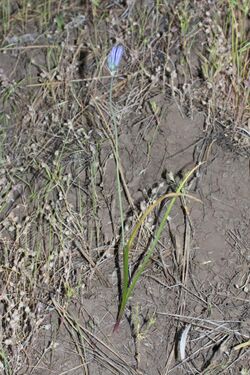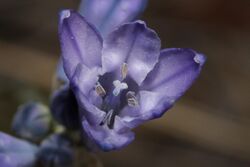Biology:Triteleia grandiflora
| Triteleia grandiflora | |
|---|---|

| |
| Triteleia grandiflora in Wenas Wildlife Area, Washington | |
| Scientific classification Error creating thumbnail: Unable to save thumbnail to destination
| |
| Kingdom: | Plantae |
| Clade: | Tracheophytes |
| Clade: | Angiosperms |
| Clade: | Monocots |
| Order: | Asparagales |
| Family: | Asparagaceae |
| Subfamily: | Brodiaeoideae |
| Genus: | Triteleia |
| Species: | T. grandiflora
|
| Binomial name | |
| Triteleia grandiflora | |
| Synonyms[1] | |
| |
Triteleia grandiflora is a species of flowering plant known by the common names largeflower triteleia,[2] largeflower tripletlily, and wild hyacinth.
Description
Triteleia grandiflora is a perennial herb growing from a corm. It produces two or three basal leaves up to 70 centimetres (28 in) long by 1 cm wide. The inflorescence arises on a smooth, erect stem up to 75 cm (30 in) tall and bears an umbel-like cluster of many blue to white flowers. Each flower is a funnel-shaped bloom borne on a pedicel up to 4 or 5 cm long. The flower may be up to 3.5 cm long including the tubular throat and six tepals each just over 1 cm long. The inner set of three tepals are somewhat ruffled and broader than the outer tepals. The flower corolla may be deep blue to almost white with a darker blue mid-vein. There are six stamens with purple or yellow anthers. The prominent tubular flower throat distinguishes T. grandiflora from Triteleia hyacinthina, whose range overlaps T. grandiflora.
Distribution and habitat
Triteleia grandiflora is native to western North America from British Columbia to extreme northern California , eastward into Idaho, Montana and northern Utah, with disjunct populations occurring in Wyoming and Colorado.[3][4] Its habitat includes grassland, sagebrush, woodlands, and forests.[citation needed]
Uses
The corm provides food for various wild rodents and livestock, and Native Americans and settlers found them edible as well.[3]
See also
- List of plants known as lily
References
- ↑ Kew World Checklist of Selected Plant Families
- ↑ "Triteleia grandiflora". Natural Resources Conservation Service PLANTS Database. USDA. https://plants.usda.gov/core/profile?symbol=TRGR7. Retrieved 16 December 2015.
- ↑ 3.0 3.1 Ladyman, J. (2007). Triteleia grandiflora: A technical conservation assessment. US Forest Service.
- ↑ Biota of North America Program, 2013 county distribution map
External links
| Wikimedia Commons has media related to Triteleia grandiflora. |
- Jepson Manual Treatment: var. howellii
- Flora of North America
- Washington Burke Museum
- Southwest Colorado Wildflowers
- Photo gallery
Wikidata ☰ Q7844267 entry
 |


